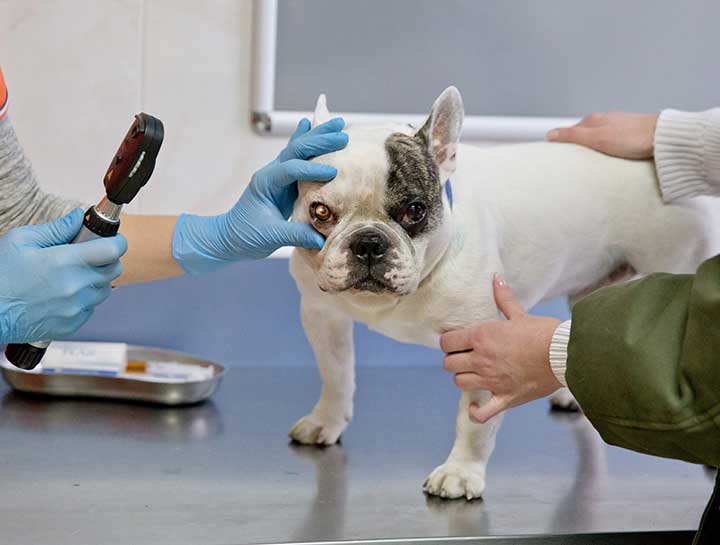Ophthalmology
Minor to severe eye care for pets
No matter how acute your dog's auditory and olfactory senses may be, he still depends on his vision to help him get around, avoid danger, and follow your instructions and other visual cues. That's why you need to provide your dog with the necessary veterinary evaluation and care when he exhibits an eye problem that might threaten his health and/or vision. Here at North Central Animal Hospital, we can provide both regular preventative exams and treatments as needed to help your dog maintain optimal eyesight for years to come.
Common Eye Problems in Dogs
Some of the most common eye and vision problems that affect humans also afflict dogs. For example, older dogs may develop cataracts just as older humans do. These cloudy accumulations in the lenses of the eyes prevent light from entering, reducing vision and potentially causing blindness. Dogs can also develop glaucoma (increased eye pressure leading to blindness) and allergic or infectious conjunctivitis (also known as pinkeye).
Corneal injuries or ailments can lead to lasting vision loss without proper care. Examples of such conditions include corneal scratches and ulcerations. Chronic dry eye in dogs can also lead to corneal damage if it doesn't receive the proper veterinary attention. Some dogs also experience corneal abrasions or eye irritation from a condition called entropion, in which the eyelid curls inward so that the eyelashes touch the eye tissues.
Other eye problems are more specific to canines. Cherry eye is a condition characterized by a prolapse of the third eyelid, a result of weakened ligaments that can be genetic. Dogs can also develop cysts or other masses on their eyelids. Short-faced dogs such as Pugs can experience proptosis, in which the eyeball actually pushes out of the eye socket. These breeds have a genetically malformed skull which creates a shallow eye socket.
Glaucoma Management
Glaucoma is a common condition in which the fluid pressure inside the eye increases, resulting in damage to the optic nerve, followed by loss of vision and blindness. There are two types of glaucoma. Primary, or chronic, glaucoma is hereditary or develops as your pet ages. Secondary, or acute, glaucoma develops as the result of an injury or illness. Because secondary glaucoma can progress rapidly, it is considered an emergency situation.
Symptoms of glaucoma to look for include:
- Redness in the eye
- Tearing or discharge
- Eye sensitivity to light
- Pain
- Cloudy-looking eye
- Bulging eyeball
Need a Veterinarian for Dogs' Eyes? Contact Our Phoenix Clinic
These are emergency situations that warrant immediate care. Some eye cases can cause blindness in 24 hours. If your dog has developed red eyes bring him to our Phoenix veterinary clinic immediately. We can evaluate your dog's eyes and vision to determine the nature and severity of the problem.
Treatment for dog eye issues can vary according to the underlying issue. Conditions such as cherry eye, cataracts, entropion, or proptosis may require surgery. Conjunctivitis, glaucoma and dry eye often respond well to medicated or lubricating eye drops. We will explain the treatment options to you and customize your dog's treatment plan to suit his specific needs.
Call us at (602) 395-9773 or request online to schedule a consultation.

